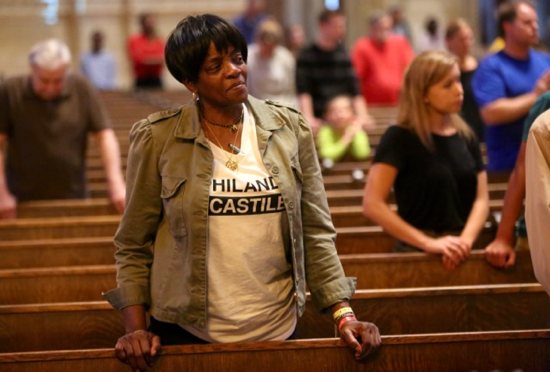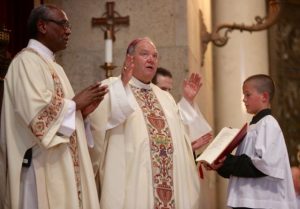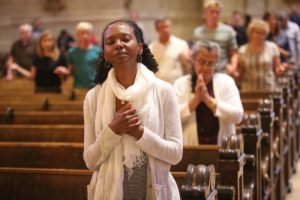
Archbishop Bernard Hebda focused on the need for unity and healing in the Twin Cities and country during a Mass for peace and justice July 8.
“Sacred Scripture reminds us that nothing is impossible with God,” he said at the Mass, which drew about 250 people to the Cathedral of St. Paul in St. Paul.
“We come before him at this Eucharist to ask him to heal the divisions that weaken us as community,” he said, “that he strengthen us when we tend to lose hope, that he enlighten us when we fail to see his image in one another, and that he use us, his Church, as the field hospital he desires to tend the wounds of those who are hurting at this difficult time.”
The Mass was offered in response to the July 6 shooting death of St. Paul resident Philando Castile by a police officer. During the liturgy, Archbishop Hebda prayed for the people most affected by Castile’s death.
Castile, who was black, was shot in his car four times by a police officer in Falcon Heights during a 9 p.m. traffic stop. Castile’s girlfriend, Diamond Reynolds, was in the passenger seat and broadcasted the aftermath of the shooting via Facebook Live. Her 4-year-old daughter was also with them. Castile died about 20 minutes later at Hennepin County Medical Center in Minneapolis.
According to Diamond’s explanation on the video, Castile, 32, had a firearm, was licensed to carry, and had told the officer. The distressed-sounding officer who shot him, Jeronimo Yanez, can be heard saying, “I told him not to reach for it. I told him to get his hand off it.”
Reynolds said, “You told him to get his ID, sir, his driver’s license.”
Yanez and his partner, Joseph Kauser, who was also at the scene, are St. Anthony Police Department officers. They are on paid administrative leave during an investigation by the Minnesota Bureau of Criminal Apprehension. A statement since released by Yanez’s attorney said the officer reacted to the presence of a gun, not to Castile’s race.
Castile’s shooting came a day after police shot and killed a black man selling CDs outside a convenience store in Baton Rouge, Louisiana. The shooting deaths sparked Black Lives Matter demonstrations across the country, including in Dallas, where, on July 7, a sniper shot 11 police officers, killing five, and also wounded a civilian.

The Mass, which was held during the Cathedral’s regular 5:15 p.m. daily liturgy, was a special Mass for the Preservation of Peace and Justice found in the Roman Missal. The prayers focused on peace, unity, and hope amid darkness and suffering. The Gospel reading was the Beatitudes.
Archbishop Hebda began his homily with the first part of 1 Corinthians 12:26: “If one part of the body suffers, all the parts suffer with it,” and tied it to those suffering from the deaths of Castile and the Dallas officers.
He said people feel the pain of those who are treated differently because of their race or country of origin, and of police officers “who feel that they are being misjudged and underappreciated.”
“Feeling that pain in our community and beyond, it’s easy to feel overwhelmed, helpless, anxious, and yet it is precisely in those moments that we know our own weakness that we have the opportunity to make known the love and strength of our God, a God that offered a great hope to his people at a time when they were hopeless,” he said.
He said that for people of faith, Mass is “the way we know best” to come before God, “to seek his consolation, his guidance, his strength, asking him to use us as repairers of the breach and restorers of streets to live in.”
He urged the faithful to work toward peace and unity by first examining their consciences and asking for forgiveness for the times they have caused division and misjudged others.
He pointed to a pastoral letter on racism Archbishop Emeritus Harry Flynn wrote in 2003.
“He noted that resisting racism requires that we examine our basic instincts and assumptions about race, how these assumptions shape our daily lives,” Archbishop Hebda said. “Are we able to see Jesus in people whose skin color is different than ours?”
Archbishop Hebda reminded the congregation that it is the Year of Mercy and “we have a God that not only forgives us, he bestows his Spirit upon us . . . and leads us on the path of righteousness and in the way of peace. He can truly make all things new.”
At the end of Mass, Archbishop Hebda asked people to continue to pray for community leaders as they make difficult decisions.
Concelebrating the Mass were Father John Ubel, Cathedral rector; Msgr. Aloysius Callaghan, rector of the St. Paul Seminary in St. Paul; and Father Michael Creagan, pastor of St. Joseph in West St. Paul. Assisting at the Mass was Deacon Phil Stewart. The liturgy concluded with the hymn “Let There Be Peace on Earth.”

Eleni Demissie, a health care data analysist and Cathedral parishioner, said she regularly attends daily Mass at the Cathedral, but it was meaningful to have that evening’s liturgy respond to Castile’s death.
“I’m saddened by what’s going on right now,” she said. “It’s really a privilege to be able to offer up whatever we’re going through. One thing I know to do is pray, so I’m glad to be able to contribute that way.”
Asked whether being a woman of color affected the way she responded to Castile’s death, she said, “I approach it as a Christian.”
Sitting a few pews behind Demissie was Sharon James-Abba, who was wearing a white T-shirt with “Philando Castile” printed on the front.
She said she received the T-shirt the night before at a vigil organized by Black Lives Matter that began outside J.J. Hill Montessori Magnet School in St. Paul, where Castile worked as a cafeteria supervisor, and evolved into a protest at the governor’s mansion six blocks away. Wearing the T-shirt was a sign of support, she said.
James-Abba, who is Baptist and lives near the Cathedral, said she heard about the Mass on the news and was looking for a place to be quiet.
“It’s just too much,” she said of Castile’s death and other violence in the city and country. As a black woman, mother and grandmother, the recent events made a deep emotional impact on her.
“I just needed to come and hear something uplifting,” she said of the Mass.
Cathedral parishioner Andrena Guines said the Mass for peace and justice drew three times the number of the Cathedral’s regular Friday evening Massgoers.
An IT business systems analyst, Guines said she was also at the vigil at the school and protest in front of the governor’s mansion. A black woman, she said she experiences racism daily.
“I think a lot of people in the Church, and not just the Twin Cities, they are afraid to have the hard conversations about racism and the effect that it has on people on a daily basis, regardless of their profession,” she said. “I applaud Archbishop Hebda for addressing the issue head on and dealing with it. The liturgy today reflected his objective, which was to bring us together and have a sense of peace.”



